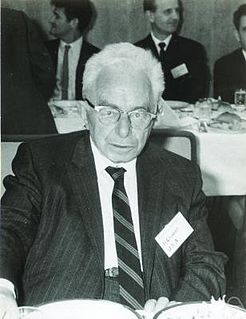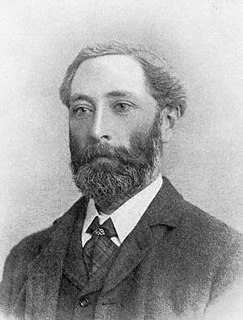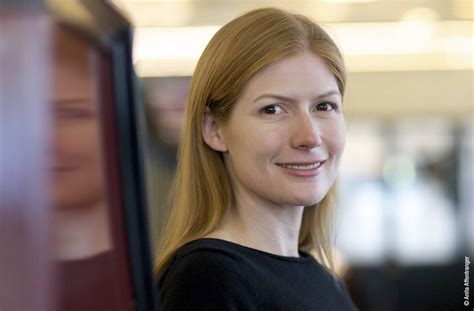A Quote by Charles Koch
You'll remember Newton was furious at Leibniz, because he developed calculus at the same time. And he went to his death believing that he had copied him. And no, it's because all the elements were there, so it's almost inevitable that the next discovery - as long as people are free and allowed to experiment and try new things.
Related Quotes
Foreshadowings of the principles and even of the language of [the infinitesimal] calculus can be found in the writings of Napier, Kepler, Cavalieri, Pascal, Fermat, Wallis, and Barrow. It was Newton's good luck to come at a time when everything was ripe for the discovery, and his ability enabled him to construct almost at once a complete calculus.
The old idea that some genius pulls all of this stuff out of the air is ridiculous. As Ridley pointed out, the only way Edison could invent the lightbulb is because all the elements had been developed before. That's obvious it wasn't just his genius - 20 others developed it at the same time. And that's true for almost every invention and discovery.
I was trying to run something to ground that had come to my attention when I was working on the Baroque Cycle. That series, of course, was about the conflict between Newton and Leibniz. Leibniz developed a system of metaphysics called monadology, which looked pretty weird at the time and was promptly buried by Newtonian-style physics.
Think about death. You do not know how much time remains to you. And remember that if you do not become different, everything will be repeated again, all foolish blunders, all silly mistakes, all loss of time and opportunity - everything will be repeated with the exception of the chance you had this time, because chance never comes in the same form.You will have to look for your chance next time. And in order to do this, you will have to remember many things, and how will you remember then if you do not remember anything now?
Woodrow Wilson was the president of the United States in 1920, and he was made a fool of - his wife almost divorced him - because he wouldn't support women's suffrage. He was president during World War I, but I look back upon him as a coward. Because he knew the right thing to do - the right of women to vote was an idea whose time had come a long time before then, when a lot of women were put into prison or persecuted because they fought for it.
The study of the Life of Jesus has had a curious history. It set out in quest of the historical Jesus, believing that when it had found Him it could bring Him straight into our time as a Teacher and Saviour. ... But He does not stay; He passes by our time and returns to His own... He returned to His own time, not owing to the application of any historical ingenuity, but by the same inevitable necessity by which the liberated pendulum returns to its original position.
When they started to drain a swamp where birds and fish had lived, for a new housing development down the road from his apartment, Steven watched the protests and the preparations with interest. The bird people were furious, the developers unmovable, and Steven was filled with relief that the fight wasn't his. Nothing here was his... He thought there should have been something sad about how little he was tied up with the place, but instead it felt like freedom. He was free because it wasn't his water here, and they weren't his fish.
He felt as though he were failing in practically every area of his life. Lately, happiness seemed as distant and unattainable to him as space travel. He hadn't always felt this way. There had been a long period of time during which he remembered being very happy. But things change. People change. Change was one of the inevitable laws of nature, exacting its toll on people's lives. Mistakes are made, regrets form, and all that was left were repercussions that made something as simple as rising from the bed seem almost laborious.
Remember when you got into the word and it wasn’t because you had a sermon to prepare or you needed to learn some things or there were some doctrinal problems or you knew that to progress as a useful servant you had to continue on in the things of the word of God? Do you remember when you just got into the word because you wanted to hear something from God? You wanted to know something about Him. Do you remember when you just prayed because of Him? Is your heart burning for Him?
The power of a text when it is read is different from the power it has when it is copied out. Only the copied text thus commands the soul of him who is occupied with it, whereas the mere reader never discovers the new aspects of his inner self that are opened by the text, that road cut through the interior jungle forever closing behind it: because the reader follows the movement of his mind in the free flight of day-dreaming, whereas the copier submits it to command.
It was only after I had been out of the art school that I actually copied a small Seurat, and I copied it in order to follow his thought, because if you do copy an artist, and you have a close feeling for him, in fact that you need to know more about his work, there is no better way than actually to copy, because you get very close indeed to how somebody thinks.
We fear death because of pain, and because of the thought that we may become obliterated. This idea is erroneous. Jesus showed himself in a physical form to his disciples after his death. Lahiri Mahasaya returned in the flesh the next day after he had entered mahasamadhi. They proved that they were not destroyed.
I should’ve been furious, but for some reason I wasn’t. Maybe because I knew he was telling the truth. Maybe because Voron left me just like that, without the much-needed explanations. Maybe because things I had learned about him since his death had made me doubt everything he’d ever said to me. Whatever the case, I felt only a hollow, crushing sadness. How touching. I understood my adoptive father’s killer. Maybe after this was over, Hugh’s head and I could sing “Kumbaya” together by the fire.

































